My Business Doesn’t Show Up for Local Searches: The “Local Keyword” Audit You Need
Discover why your business is invisible in local search results and learn how to conduct a comprehensive local keyword audit to improve your visibility and attract more local customers.
Start Your Local Keyword AuditAre you frustrated because your business doesn’t appear when potential customers search for services in your area? You’re not alone. Many businesses struggle with local search visibility, often because they haven’t conducted a proper local keyword audit. This comprehensive guide will walk you through the process of identifying, analyzing, and implementing the right local keywords to boost your visibility in local search results.
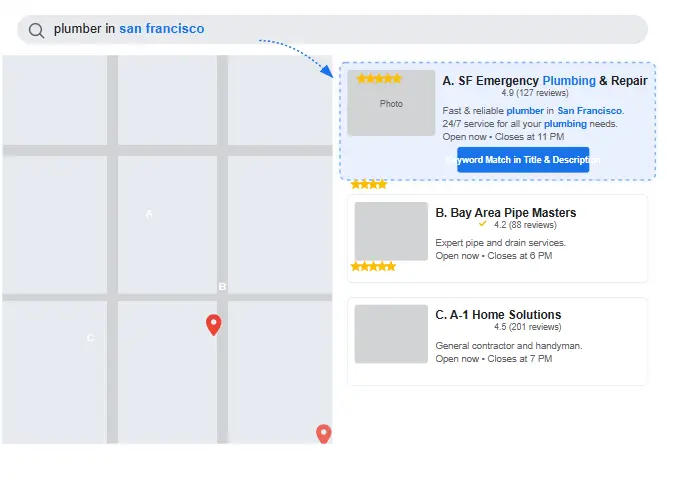
Table of Contents
- Understanding Local SEO and Its Importance
- What is a Local Keyword Audit?
- Step-by-Step Guide to Conducting a Local Keyword Audit
- Essential Tools for Local Keyword Research
- Implementing Local Keywords on Your Website
- Optimizing Your Google Business Profile with Local Keywords
- Building Local Citations and Ensuring Consistency
- Measuring Local SEO Success
- Common Local Keyword Mistakes to Avoid
- Conclusion: Taking Action on Your Local Keyword Audit
Understanding Local SEO and Its Importance
Local SEO is the process of optimizing your online presence to attract more business from relevant local searches. These searches take place on Google and other search engines, with a focus on geographic modifiers. When someone searches for “plumber near me” or “best coffee shop in Brooklyn,” search engines use complex algorithms to deliver the most relevant local results.
The importance of local SEO cannot be overstated. Consider these statistics:
- 46% of all Google searches are looking for local information (Source: Search Engine Journal)
- 72% of consumers who perform a local search visit a store within five miles (Source: WordStream)
- 28% of searches for something nearby result in a purchase (Source: Think with Google)
- Local searches lead 50% of mobile users to visit stores within one day (Source: Go-Globe)
Despite these compelling numbers, many businesses fail to appear in local search results simply because they haven’t implemented a proper local keyword strategy. This is where a local keyword audit becomes invaluable. For a comprehensive understanding of local SEO fundamentals, check out our complete guide to local SEO.
Why Local Keywords Matter
Local keywords are search terms that include geographic qualifiers, such as city names, neighborhoods, or “near me” phrases. These keywords signal to search engines that your business is relevant to users in a specific location, increasing your chances of appearing in local search results and on Google Maps.
What is a Local Keyword Audit?
A local keyword audit is a comprehensive analysis of your current keyword strategy with a focus on local search terms. It involves identifying which local keywords your target audience is using, analyzing how your website currently ranks for these terms, and uncovering opportunities to improve your visibility.
Unlike a general keyword audit, a local keyword audit specifically focuses on terms that include geographic modifiers or indicate local intent. This includes:
- Keywords with city names (e.g., “plumber in Seattle”)
- Keywords with neighborhood names (e.g., “Italian restaurant in Greenwich Village”)
- “Near me” searches (e.g., “coffee shop near me”)
- Keywords with state or region names (e.g., “best hiking trails in Colorado”)
- Keywords that imply local service even without explicit geographic terms (e.g., “emergency plumber”)
By conducting a thorough local keyword audit, you can gain valuable insights into how potential customers are searching for businesses like yours in your area and ensure that your online content aligns with their search behavior.
Step-by-Step Guide to Conducting a Local Keyword Audit
Now that you understand what a local keyword audit is and why it’s important, let’s walk through the process step by step:
Step 1: Define Your Service Areas
Before you can identify relevant local keywords, you need to clearly define the geographic areas you serve. This could be:
- Your city and surrounding areas
- Specific neighborhoods
- Multiple cities or counties
- A specific radius around your business location
Be realistic about where you can provide services. If you’re a small local business, trying to rank for statewide terms may be unrealistic and dilute your efforts. Focus on the areas where you can genuinely serve customers.
Step 2: Identify Your Core Services
List all the products or services you offer. Be as specific as possible. For example, instead of just “plumbing services,” break it down into:
- Emergency plumbing repairs
- Drain cleaning
- Water heater installation
- Pipe repair and replacement
- Bathroom plumbing
The more specific you are about your services, the better you’ll be able to match local keyword searches to what you actually offer.
Step 3: Brainstorm Initial Local Keywords
Combine your service areas with your core services to create an initial list of local keywords. Use different geographic modifiers:
- [Service] in [City]
- [Service] [City]
- [Service] near [Neighborhood]
- Best [Service] in [City]
- [City] [Service] company
- Affordable [Service] in [City]
Don’t forget to include “near me” variations, as these have become increasingly common with mobile search.
Step 4: Analyze Search Intent
Not all local keywords are created equal. Understanding the intent behind each search term is crucial. Search intent typically falls into these categories:
- Informational: The user is looking for information (e.g., “how to fix a leaky faucet”)
- Navigational: The user wants to find a specific business (e.g., “Joe’s Plumbing address”)
- Transactional: The user is ready to make a purchase or hire a service (e.g., “emergency plumber in Brooklyn”)
- Commercial Investigation: The user is comparing options before making a decision (e.g., “best coffee shop in Seattle”)
For most local businesses, transactional and commercial investigation keywords are most valuable, as they indicate users who are ready to make a purchase or hire a service.
Step 5: Research Keyword Volume and Competition
Use keyword research tools to analyze the search volume and competition level for your local keywords. While local keywords typically have lower search volumes than broad terms, they often have higher conversion rates because they’re more specific.
Look for keywords with a good balance of search volume and competition. Extremely high-competition keywords might be difficult to rank for, especially if you’re just starting with local SEO.
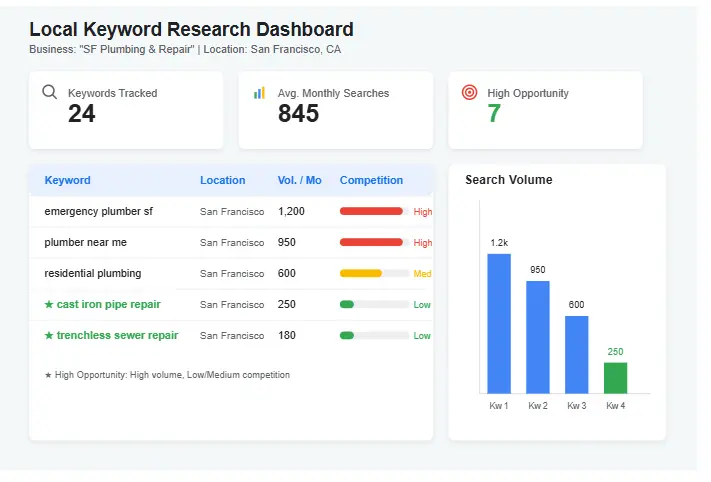
Step 6: Analyze Your Current Rankings
Conduct an audit of where your website currently ranks for your target local keywords. This will help you:
- Identify keywords you’re already ranking well for (and can optimize further)
- Find keywords where you’re on page 2 or 3 (and could potentially improve with some effort)
- Discover important keywords you’re not ranking for at all (and need to target)
Step 7: Analyze Competitor Keywords
Identify your top local competitors and analyze which local keywords they’re ranking for. This can reveal valuable opportunities you might have missed. Look for:
- Keywords multiple competitors are ranking for (indicating high value)
- Keywords where your competitors have weak rankings (opportunities to outrank them)
- Local keywords you haven’t targeted yet
Step 8: Prioritize Your Local Keywords
Based on your research, create a prioritized list of local keywords to target. Consider factors like:
- Relevance to your business
- Search volume
- Competition level
- Your current ranking
- Business value (how likely a search is to lead to a conversion)
Create a spreadsheet with all this information to help you prioritize your efforts.
Local Keyword Audit Checklist
- Defined your service areas
- Listed all your core services
- Brainstormed initial local keywords
- Analyzed search intent for each keyword
- Researched keyword volume and competition
- Audited your current rankings
- Analyzed competitor keywords
- Prioritized your local keywords based on business value
Essential Tools for Local Keyword Research
Conducting a thorough local keyword audit requires the right tools. Here are some essential options:
Google Keyword Planner
Free tool from Google that provides keyword ideas and traffic estimates. While it’s primarily designed for paid search, it’s still valuable for organic keyword research, especially for finding local search volume data. Visit Google Keyword Planner
Google Search Console
Shows which search queries are already bringing traffic to your site, including local terms. This helps you understand your current local keyword performance. Access Google Search Console
SEMrush
Comprehensive SEO tool with local keyword research capabilities. It allows you to analyze local keyword difficulty, track rankings by location, and spy on competitor local keywords. Explore SEMrush
Ahrefs
Another powerful SEO tool with excellent keyword research features. Its “Keywords Explorer” allows you to filter by search engine and location, making it ideal for local keyword research. Check out Ahrefs
Moz Local
Specifically designed for local SEO, Moz Local helps you manage your local listings and provides insights into local search performance. Learn about Moz Local
BrightLocal
A comprehensive local SEO platform that offers local search rank tracking, citation building, and Google Business Profile optimization. Discover BrightLocal
AnswerThePublic
Visual keyword research tool that shows what questions people are asking about a particular topic. It’s great for finding local long-tail keywords and content ideas. Try AnswerThePublic
Google Trends
Allows you to compare the popularity of search terms over time and by location. It’s useful for identifying seasonal local keyword trends. Explore Google Trends
Implementing Local Keywords on Your Website
Once you’ve identified your target local keywords, it’s time to implement them strategically on your website. Here’s how:
1. Optimize Page Titles and Meta Descriptions
Your page title is one of the most important on-page SEO elements. Include your primary local keyword in the title, preferably near the beginning. For example:
“Emergency Plumber in Brooklyn | 24/7 Plumbing Services”
Similarly, include local keywords in your meta descriptions to improve click-through rates from search results. While meta descriptions don’t directly impact rankings, they do influence whether users click on your listing.
2. Create Location-Specific Landing Pages
If you serve multiple locations, create dedicated landing pages for each area. These pages should be optimized with local keywords specific to that location. For example, a plumbing company serving multiple neighborhoods might have separate pages for “Plumbing Services in Brooklyn Heights” and “Plumbing Services in Williamsburg.”
Each location page should include:
- The location name in the page title, URL, and headings
- Specific services offered in that area
- Local testimonials or case studies
- Embedded Google Map of the area
- Unique content that’s not duplicated across other location pages
3. Optimize Header Tags
Include local keywords in your header tags (H1, H2, H3, etc.). Your H1 should typically include your primary local keyword for the page. Use H2 and H3 tags for secondary local keywords and related topics.
4. Incorporate Local Keywords Naturally in Content
Weave local keywords naturally throughout your page content. Avoid keyword stuffing, which can harm your rankings. Instead, focus on creating valuable content that answers the questions your local customers are asking.
For example, if you’re targeting “emergency plumber in Brooklyn,” your content might address:
- Common plumbing emergencies in Brooklyn
- How to find a reliable emergency plumber in Brooklyn
- What to do while waiting for a plumber to arrive
- Average costs for emergency plumbing services in Brooklyn
5. Optimize Image Alt Text
Include local keywords in your image alt text where appropriate. For example, “Emergency plumber fixing burst pipe in Brooklyn home” instead of just “Plumber working.”
6. Include Local Keywords in URLs
Create SEO-friendly URLs that include your local keywords. For example:
www.yourwebsite.com/emergency-plumber-brooklyn
instead of
www.yourwebsite.com/services/page123
7. Add Local Business Schema Markup
Schema markup is code that helps search engines understand your content better. Local Business schema can highlight important information like your business name, address, phone number, and service areas. This structured data can help you appear in rich snippets and improve your visibility in local search results. Learn about Local Business Schema
8. Create Local Content
Develop content that’s specifically relevant to your local audience. This could include:
- Blog posts about local events or news related to your industry
- Guides to local resources or attractions
- Case studies featuring local customers
- Interviews with other local business owners or community leaders
This type of content not only helps with local keyword optimization but also establishes your business as an active member of the local community.
Optimizing Your Google Business Profile with Local Keywords
Your Google Business Profile (formerly Google My Business) is one of the most important factors for local search visibility. Here’s how to optimize it with local keywords:
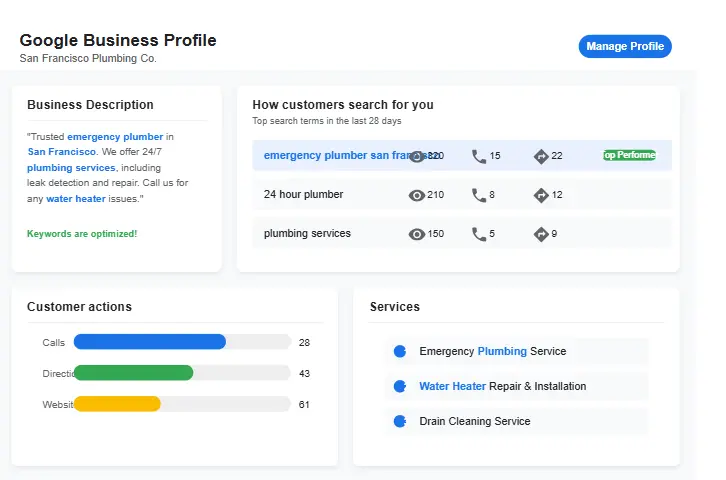
1. Complete Every Section of Your Profile
Google rewards comprehensive profiles. Fill out every section, including services, products, attributes, and photos. The more complete your profile, the better your chances of ranking for local searches. Manage your Google Business Profile
2. Optimize Your Business Name
While you shouldn’t stuff keywords into your business name (this is against Google’s guidelines), you can include a single descriptor that accurately describes your business. For example, “Joe’s Plumbing” could become “Joe’s Plumbing & Heating” if that accurately reflects your services. Read Google’s guidelines on business names
3. Use Local Keywords in Your Business Description
Your business description is a great place to incorporate local keywords naturally. Describe what you do, who you serve, and the areas you cover.
4. Select the Right Categories
Choose primary and secondary categories that accurately represent your business. These categories help Google understand what searches your business is relevant for.
5. Optimize Your Services
List all your services and use local keywords in the descriptions. For example, instead of just “Drain Cleaning,” you might have “Residential Drain Cleaning in Brooklyn” and “Commercial Drain Cleaning in Manhattan.”
6. Encourage and Respond to Reviews
Reviews are a crucial local ranking factor. Encourage customers to leave reviews and respond to all of them—both positive and negative. When responding, you can naturally incorporate local keywords.
7. Upload Local Photos and Videos
Add photos and videos of your business, team, and completed work. Geotag these images with your location when possible. In the image descriptions, include local keywords where appropriate.
8. Use Google Posts Regularly
Google Posts allow you to share updates, offers, and events directly on your Business Profile. Use these posts to target local keywords and keep your profile active.
9. Set Your Service Area Correctly
If you’re a service-area business rather than a brick-and-mortar store, accurately define the areas you serve. This helps Google understand which local searches your business is relevant for.
Google Maps Optimization Resources
For a comprehensive guide to dominating Google Maps, check out our Local SEO Blueprint for Google Maps. This resource provides step-by-step instructions for:
- Optimizing your Google Business Profile for maximum visibility
- Implementing local keyword strategies specifically for Google Maps
- Building local authority to improve your map rankings
- Advanced techniques for appearing in the local 3-pack
Building Local Citations and Ensuring Consistency
Local citations are online mentions of your business name, address, and phone number (NAP). These citations play a crucial role in local SEO by helping search engines verify the existence and legitimacy of your business.
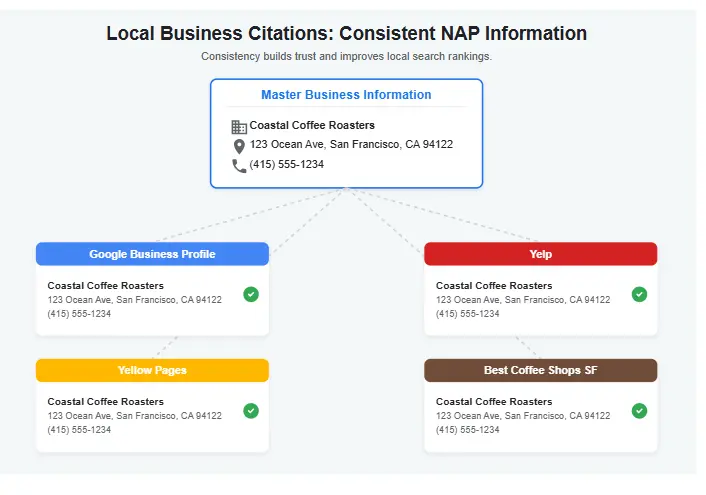
Why Citation Consistency Matters
Search engines cross-reference citations to validate the accuracy of your business information. Inconsistent NAP details across different platforms can confuse search engines and potentially harm your local rankings.
How to Build Quality Local Citations
- Start with Major Directories: Ensure your business is listed on Google Business Profile, Bing Places, Apple Maps, and other major directories.
- Target Industry-Specific Directories: Look for directories specific to your industry. For example, a restaurant should be on Yelp, TripAdvisor, and OpenTable.
- Focus on Local Directories: Identify local business directories, chamber of commerce websites, and local resource sites.
- Ensure NAP Consistency: Make sure your business name, address, and phone number are exactly the same across all citations.
- Complete Your Profiles: Fill out all available fields, including business description, services, photos, and website URL.
Tools for Managing Citations
Consider using citation management tools like BrightLocal, Moz Local, or Yext to streamline the process of building and managing your citations. These tools can help you identify inconsistent citations and submit your information to multiple directories at once.
Measuring Local SEO Success
After implementing your local keyword strategy, it’s important to track your progress and measure the effectiveness of your efforts. Here are the key metrics to monitor:
1. Local Keyword Rankings
Track your rankings for target local keywords. Use tools like SEMrush, Ahrefs, or BrightLocal to monitor your position in local search results and on Google Maps.
2. Website Traffic from Local Searches
Use Google Analytics to monitor organic traffic from local searches. You can segment this data by location to see how much traffic is coming from your target service areas. Access Google Analytics
3. Google Business Profile Insights
Regularly review your Google Business Profile insights to track:
- How many users found your business through direct searches vs. discovery searches
- How many users called your business directly from the listing
- How many users requested directions to your location
- How many users clicked through to your website
4. Conversion Rates
Ultimately, the goal of local SEO is to drive conversions. Track how many leads, calls, or sales are generated from local search traffic. Set up conversion tracking in Google Analytics to measure the ROI of your local SEO efforts.
5. Online Reviews
Monitor the quantity and quality of your online reviews. An increase in positive reviews is often correlated with improved local search visibility.
6. Click-Through Rates (CTR)
Use Google Search Console to monitor the CTR for your local keywords. If you’re ranking well but have a low CTR, you may need to improve your titles and meta descriptions to make them more compelling.
Local SEO Case Studies
See how real businesses have improved their local search visibility with our Local SEO Case Studies. These examples demonstrate:
- How a local restaurant increased foot traffic by 47% through targeted local keyword optimization
- A service business that went from invisible to dominating the local 3-pack in just 3 months
- The step-by-step process used to help a multi-location business improve rankings across all service areas
- Real-world examples of local keyword audits and their impact on business growth
Common Local Keyword Mistakes to Avoid
As you implement your local keyword strategy, be aware of these common mistakes:
1. Keyword Stuffing
Overusing local keywords in an unnatural way can harm your rankings. Focus on creating valuable content that incorporates keywords naturally.
2. Ignoring Mobile Users
Many local searches happen on mobile devices. Ensure your website is mobile-friendly and that your local content is easily accessible on smaller screens. Test your site’s mobile-friendliness
3. Targeting the Wrong Locations
Don’t try to rank for locations you don’t serve. This will only attract irrelevant traffic and waste your SEO efforts.
4. Inconsistent NAP Information
Inconsistent business information across the web can confuse search engines and harm your local rankings. Ensure your NAP details are consistent everywhere.
5. Neglecting Your Google Business Profile
Your Google Business Profile is crucial for local search visibility. Neglecting it is one of the biggest mistakes you can make in local SEO.
6. Creating Duplicate Content
When creating location-specific pages, avoid simply duplicating content and changing the location name. Each page should offer unique value.
7. Forgetting About Voice Search
With the rise of voice assistants, many local searches are now conducted through voice. Optimize for conversational, question-based local keywords.
8. Ignoring Online Reviews
Reviews are a significant local ranking factor. Ignoring them or failing to respond can harm your reputation and your search visibility.
Conclusion: Taking Action on Your Local Keyword Audit
A comprehensive local keyword audit is the foundation of a successful local SEO strategy. By understanding how your target customers are searching for businesses like yours in your area, you can optimize your online presence to meet their needs and improve your visibility in local search results.
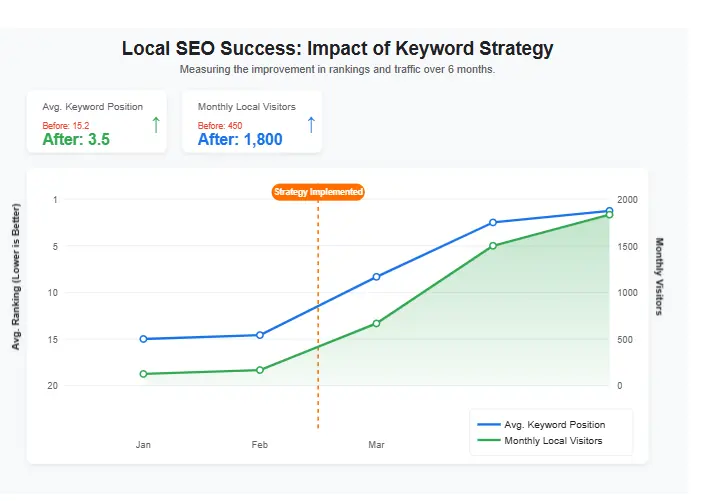
Remember that local SEO is an ongoing process, not a one-time task. Search algorithms evolve, customer behaviors change, and competitors adjust their strategies. Regularly revisit your local keyword audit to ensure you’re targeting the right terms and adapting to changes in the local search landscape.
By following the steps outlined in this guide—defining your service areas, identifying relevant local keywords, analyzing your current performance, implementing strategic optimizations, and measuring your results—you’ll be well on your way to improving your visibility in local search and attracting more customers to your business.
Don’t let your business remain invisible to local customers. Start your local keyword audit today and take the first step toward dominating local search in your industry.
Ready to Improve Your Local Search Visibility?
Our team of local SEO experts can help you conduct a comprehensive local keyword audit and implement a strategy that drives results. Contact us today to schedule a free consultation.
Get Your Free Local SEO Audit
We respect your privacy. Your information is secure and will never be shared. By submitting this form, you agree to our privacy policy and terms of service.
